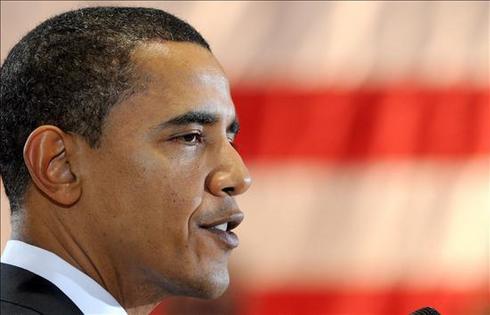US Muslims: Obama's use of Hussein in oath sends message
 Washington - Muslim Americans view Barack Obama's intention to use his middle name - Hussein - during the reciting of the oath of office as a sign that he's heeded their call for greater inclusion.
Washington - Muslim Americans view Barack Obama's intention to use his middle name - Hussein - during the reciting of the oath of office as a sign that he's heeded their call for greater inclusion.
Promptly at noon (1700 GMT) on Tuesday, Obama will lay one hand on the Bible used by president Abraham Lincoln in 1861 and swear to "preserve, protect and defend the Constitution of the United States" as the country's 44th president and first African American in the job.
In November, Obama, the son of a Keynan Muslim with the same name and an American mother, declared he would use his middle name during the oath in an interview with the Chicago Tribune.
"I think the tradition is that they use all three names, and I will follow the tradition, not trying to make a statement one way or the other," Obama said.
To Imam Yusuf Salim of Masjid Muhammad, a mosque in Washington, it will be a statement of intent.
"Obama may be Christian, but he cannot deny his roots, his heritage. Hussein is a beautiful name, meaning 'good' or 'handsome.' It was in honour of his grandfather. Why would anyone hesitate to proudly state it?"
At the mosque Monday, several Muslim American groups gathered to release 44 "doves of peace" - one for each US president - to symbolize the community's desire for peace and a larger political role. The birds were set free to cries of "Allah O Akbar," god is great.
"By reclaiming Hussein in his name, which he had to avoid during the campaign, disappointing and angering many Muslims, Obama will tell Americans and the world that he does really stand for change we can all believe in," said student Rashid Rizvi Mohiuddin, 21. "If not, we'll know it was all eloquence without substance."
Hodari Abdul Ali of Muslim Alliance in North America, a national network of mosques and Muslim organizations, said that while Obama's campaign disappointed him, he held out hope of his potential to heal the Muslim world "damaged" by President George W Bush.
"Obama distanced himself from our community during his historic campaign. It was such a dichotomy - we felt we were being kept at arm's length and yet we funded his campaign and voted for him," said Ali, a fixture at Iraq and Palestinian demonstrations.
"We want to tell him that it's now okay to embrace us," Ali said.
He said that the groups plan to reach out to two Democratic Muslim congressmen - Keith Ellison of Minneapolis, Minnesota and Andre Carson of Indianapolis, Indiana - to further their cause.
The discussion at the gathering also focused on the war in Iraq. "He pledged to get us out of Iraq and he has to do it now. As a community, we will make sure that he is reminded of this promise until he delivers," one woman said.
Others spoke of how Muslims were the "most peaceful group in America," their reputation tarnished by the "media and US policy." Teacher Masooma Khan, 44, said: "One of Allah's names means peace, another means justice. We want peace and justice for all, especially minorities, to be the cornerstones of his administration."
Nihad Awad, co-founder of the Council on American-Islamic Relations, the largest Muslim civil liberties group in the US, said the release of doves conveyed a message of renewal, "that we're turning a new page."
"Leadership and vision lead us to a day like tomorrow (Tuesday). Our wish is simple and clear - we'd like to be part of the dream that starts tomorrow," Awad said.
While Imam Salim said Obama's election "was not man-made, but a clear indication of the hand of god," taxi driver Wossen Ephrem, 53, was more skeptical.
"I feel a different connection with Obama because I'm half Christian and half Muslim, and I practise both faiths. But, like me, he is only a man and not a supreme being," Ephrem, originally from Ethiopia, said.
"I'll say a personal prayer for him, and as he walks through troubled waters, he must know that he can't do it without a higher authority. Still, his election was possible only in America."
Columnist Thomas Friedman expressed the dissonance in the New York Times, shortly after the November elections: "America is surely the only nation that could - in the same decade - go to war against a president named Hussein (Saddam of Iraq), threaten to use force against a country who most revered religious martyr is named Hussein (Iran) and then elect its own president who's middle-named Hussein." (dpa)